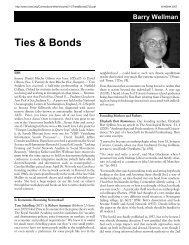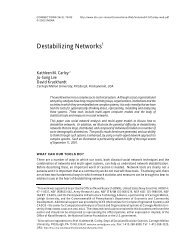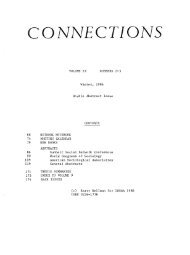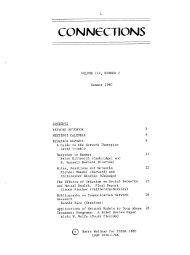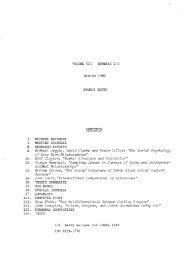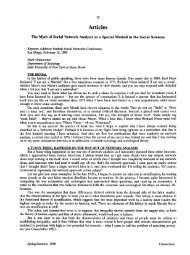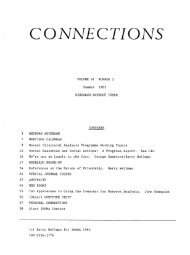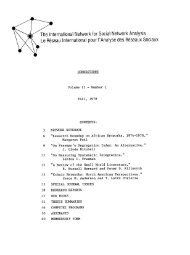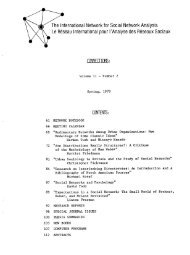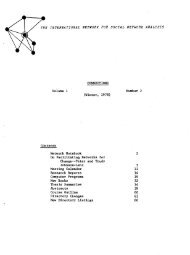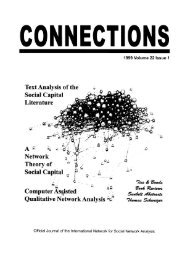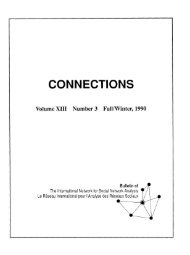Sunbelt XXXI International Network for Social Network ... - INSNA
Sunbelt XXXI International Network for Social Network ... - INSNA
Sunbelt XXXI International Network for Social Network ... - INSNA
You also want an ePaper? Increase the reach of your titles
YUMPU automatically turns print PDFs into web optimized ePapers that Google loves.
Who Shares? Exploration Of Managerial Knowledge Sharing Practices In British Columbia’s Ministry Of Health ServicesLock, Gwen E.Knowledge <strong>Network</strong>sCommunication, Organizational Change, Knowledge Transfer, Public Organizations, In<strong>for</strong>mationTHURS.AM2Over the next decade, the public sector will experience significant loss of operational knowledge from an aging managerial work<strong>for</strong>ce. To effectively manageknowledge, organizations must first understand its knowledge resources and sharing practices. The aim of this work was to surface which factors enabled orinhibited knowledge sharing between managers in the Ministry of Health Services’ in<strong>for</strong>mation management and in<strong>for</strong>mation technology division. A mixedmethodscase study approach using social network analysis and interviews was used to explore managerial knowledge sharing practices, an approach used byprevious researchers including Adkins (2008), Birk (2005), Cross and Parker (2004), and Schultz‐Jones (2007). The research questions explored thecharacteristics of an effective knowledge sharing network, contrasts between different managerial knowledge sharing practices, and perceived knowledgesharing enablers or inhibiters. <strong>Social</strong> network analysis was used to understand and visualize in<strong>for</strong>mal workplace relationship networks <strong>for</strong> 41 managers whoworked in strategic, business, and operational managerial roles. In‐depth interviews <strong>for</strong> 18 managers were used to understand their preferred knowledgesharing approaches and underlying rationale. Findings indicated that managers who used a variety of communication styles, preferably face‐to‐face, andknowledge exchange roles, such as brokerage, were more effective in sharing complex knowledge. Managers who were able to shift to a variety of brokerageroles, such as representative, consultant, or liaison were able to act as knowledge brokers within and external to the division’s managerial network. Theabsence of key enablers, such as face‐to‐face engagement, proximity, multiple communication styles, and an inflexible organizational structure were perceivedknowledge sharing barriers. Adkins, D., 2008. The use of social network analysis to measure knowledge sharing in the New York State project managementcommunity of practice. [Doctoral dissertation, University of Albany, State University of New York, 2008]. (UMI No. 3319548). Birk, S. M., 2005. A mixed‐methodstudy using social network analysis to identify an organization’s knowledge capabilities and communication paths. [Doctoral dissertation, University of Idaho,2005]. (UMI No. 3178900). Cross, R. Parker, A., 2004. The hidden power of social networks: Understanding how work really gets done in organizations, Boston:Harvard Business School Press. Schultz‐Jones, B. A., 2007. The intersection of social networks in a public service model: a case study. [Doctoral dissertation,University of North Texas, 2007].



